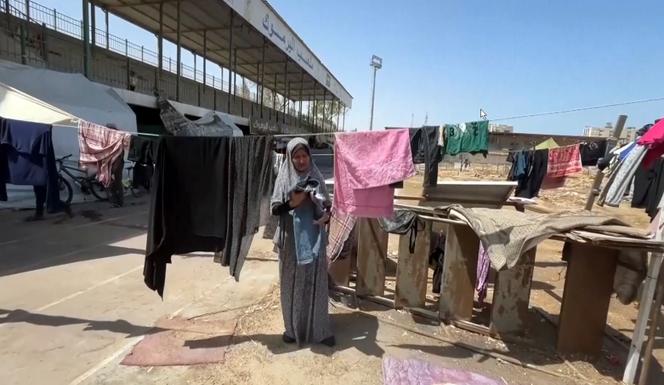


Part of the stands were destroyed by missile fire. The football pitch, once green and neatly trimmed, has been bulldozed. Mixed with the rubble, the athletics track is barely recognizable. The Yarmouk stadium, located in the Zeitoun district of Gaza City, one of the few sports venues in the coastal strip to meet international standards, is now unusable because of the damage inflicted on it by the Israeli army. "The soldiers even destroyed the electricity and irrigation systems," said Adel Al-Fasih, the facility's manager, who lost his wife and five of his children in a strike on his house.
The Yarmouk stadium has been the training ground for athletes dreaming of competing in the Olympic Games since 1995, when Palestine joined the International Olympic Committee (IOC). But since October 2023, the war waged by the Israeli army in the enclave has resulted in the death of many athletes. Among them, Hani Al-Masdar, the assistant coach of the Palestinian national football team. He died along with around 40 others in a bombing raid on Deir Al-Balah on January 6.
The star striker of the Palestinian team, Mohammed Barakat, scorer of 114 goals for the Khan Yunis club, was killed on March 11, in the same town by an Israeli strike that destroyed his house. On June 11, Majed Abu Maraheel, a long-distance runner and the very first Palestinian athlete to compete in the 1996 Olympic Games in Atlanta, US, died in the Nuseirat refugee camp from a lack of medication to treat his kidney failure.
"The list goes on and on," said President of the Palestinian Olympic Committee Nader Jayousi, who estimated that around 400 Gazan athletes have been killed since October 7, 2023. Like the Yarmouk stadium, many sports facilities in the Gaza Strip have been destroyed by the Israeli army, with no security justification whatsoever.
The arena, with a 9,000-spectator capacity, was inaugurated in 1952 when the enclave was administered by Egypt. "Our parents and grandparents saw it as a symbol of Arab cooperation and support for the Palestinian cause," recalled Al-Fasih. A place of "triumphs" and "challenges" for local clubs and national teams, the stadium, one of the oldest and largest in Palestine, offered brief escapes to the population under blockade since 2007.
As well as sporting events, the municipality of Gaza, which owns the site, organized festivals and some major weddings there. Damaged by bombardments during each war, as was the case during Operation "Cast Lead" at the end of 2008, the stadium has always been rebuilt identically, thanks to funding from the German development bank KfW, said Tamer Al-Absi, vice-president of the Palestinian Athletics Federation.
You have 40.54% of this article left to read. The rest is for subscribers only.
